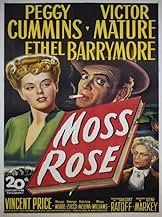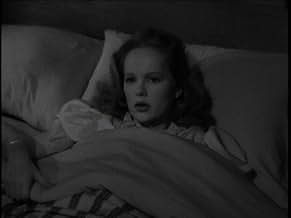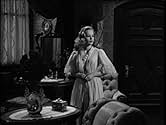Set in turn-of-the-century London, a woman trying to solve the mystery of a friend's murder finds that she may be the next victim.Set in turn-of-the-century London, a woman trying to solve the mystery of a friend's murder finds that she may be the next victim.Set in turn-of-the-century London, a woman trying to solve the mystery of a friend's murder finds that she may be the next victim.
Norman Ainsley
- Deputy Coroner
- (uncredited)
Harry Allen
- Threadbare Little Man
- (uncredited)
Frank Baker
- Lodger
- (uncredited)
Billy Bevan
- White Horse Cabby
- (uncredited)
Barbara Blaine
- Dancer
- (uncredited)
Clifford Brooke
- Chemist
- (uncredited)
Charlene Brooks
- Dancer
- (uncredited)
Colin Campbell
- Art Gallery Attendant
- (uncredited)
Leonard Carey
- Coroner
- (uncredited)
Russ Clark
- Constable
- (uncredited)
Featured reviews
Chirpy cabbies and fake fog abound in this Victorian murder mystery which ticks all of the boxes.
Daisy Arrow, a showgirl, is murdered in her room, but her friend Rose (Peggy Cummins) sees a well-dressed man leaving hurriedly. She discovers he is Michael Drego (Victor Mature), an aristocrat, and reports him to Inspector Clinner (Vincent Price). However, at the last moment she deliberately fails to identify him, choosing to use the situation to her own advantage which is - going to his country estate and experiencing the high life. Amazingly he agrees and takes her with him, explaining that she had helped him with a police matter. His mother Lady Margaret (Ethel Barrymore) takes to her, but fiancee Audrey (Patricia Medina) is suspicious of Rose's motives. Suddenly Inspector Clinner turns up. He is investigating the significance of a Bible and a Moss Rose which were found at Daisy's murder scene. The Drego's gardens are known for growing the flowers out of season and, the Bible is a new edition which could have been purchased at the local village book store. Rose tries to keep out of sight but is seen by Clinner who later sends for her. She is about to leave when Michael reveals he has fallen for her and wants to break off his engagement to Audrey. Rose is confused, but later when Audrey finds out she threatens to ruin Rose. Attempting leave again she finds Audrey, dead with a Bible and rose by her. This time Michael is arrested and the distraught Rose is looked after by Lady Margaret.......
The audience will probably have guessed the ending by this stage, but it has to be admitted that the film is entertaining. As others have mentioned, Vincent Price would probably have been better cast as Michael Drego. His distant,dreamy air would have suited the equivocal nature of the character better than Mature's brash approach. This is another of Hollywood's "British" films, but most of the cast manage a passable English accent, with the exception of Mature who goes for the spent-his-childhood-in-Canada cop out. Acting honours however go to the incomparable Ethel Barrymore who portrays Lady Margaret in every guise, from imperious matriarch to blubbering hysteric. The only fly in the ointment is Cummins. Her Cockney accent is the worst, most irritating I've ever heard, and that includes Dick Van Dyke in "Mairy Paw-puns!" For a Brit, Cummins sounds more like an American actress making a very poor attempt at the dialect. Fortunately she doesn't resort to "Strike a light!" or "Yer can't do that there 'ere!" That apart, if you can immerse yourself in the atmosphere, you will enjoy it.
Daisy Arrow, a showgirl, is murdered in her room, but her friend Rose (Peggy Cummins) sees a well-dressed man leaving hurriedly. She discovers he is Michael Drego (Victor Mature), an aristocrat, and reports him to Inspector Clinner (Vincent Price). However, at the last moment she deliberately fails to identify him, choosing to use the situation to her own advantage which is - going to his country estate and experiencing the high life. Amazingly he agrees and takes her with him, explaining that she had helped him with a police matter. His mother Lady Margaret (Ethel Barrymore) takes to her, but fiancee Audrey (Patricia Medina) is suspicious of Rose's motives. Suddenly Inspector Clinner turns up. He is investigating the significance of a Bible and a Moss Rose which were found at Daisy's murder scene. The Drego's gardens are known for growing the flowers out of season and, the Bible is a new edition which could have been purchased at the local village book store. Rose tries to keep out of sight but is seen by Clinner who later sends for her. She is about to leave when Michael reveals he has fallen for her and wants to break off his engagement to Audrey. Rose is confused, but later when Audrey finds out she threatens to ruin Rose. Attempting leave again she finds Audrey, dead with a Bible and rose by her. This time Michael is arrested and the distraught Rose is looked after by Lady Margaret.......
The audience will probably have guessed the ending by this stage, but it has to be admitted that the film is entertaining. As others have mentioned, Vincent Price would probably have been better cast as Michael Drego. His distant,dreamy air would have suited the equivocal nature of the character better than Mature's brash approach. This is another of Hollywood's "British" films, but most of the cast manage a passable English accent, with the exception of Mature who goes for the spent-his-childhood-in-Canada cop out. Acting honours however go to the incomparable Ethel Barrymore who portrays Lady Margaret in every guise, from imperious matriarch to blubbering hysteric. The only fly in the ointment is Cummins. Her Cockney accent is the worst, most irritating I've ever heard, and that includes Dick Van Dyke in "Mairy Paw-puns!" For a Brit, Cummins sounds more like an American actress making a very poor attempt at the dialect. Fortunately she doesn't resort to "Strike a light!" or "Yer can't do that there 'ere!" That apart, if you can immerse yourself in the atmosphere, you will enjoy it.
It's that smudge of fog called London under the reign of Victoria. When a music-hall dancer is murdered, a moss rose marks the page of a Bible next to her body. Luckily, another chorus girl (Peggy Cummins) saw a gentleman (Victor Mature) leaving the lodgings. She approaches him directly, saying she'll go to the police if he doesn't meet her demands, but he brushes her off contemptuously. When he learns she's dead serious, he tries to buy her off with a thick wad of pound notes. But it's not money she's after; all she wants is two weeks at his country estate, living the life of a `lady.'
And here Moss Rose, which has taken its time working up a head of steam, branches off onto a new siding. The estate contains not only Mature, his fiancée (Patricia Medina) and his formidable old dowager mother (Ethel Barrymore), but also a greenhouse where out-of-season moss roses bloom.
Apart from a few Eliza-Doolittle faux pas, the classes do not clash. Barrymore, in fact, extends Cummins a matey welcome; even Medina tries to put aside her understandable jealousy. The only apple of discord falls when Cummins strays innocently into Mature's boyhood rooms, which Barrymore preserves as a secret shrine.
Cummins finds the pastoral scene (`You'd expect to see a calendar pasted under it!' she exclaims) lives up to all her expectations. Thrown together, Mature has thawed markedly towards Cummins, and she towards him. But their idyll comes under siege with the arrival from London of bumbling Scotland Yard detective and amateur horticulturist Vincent Price, still investigating that pesky homicide. Soon there's another murder, another Bible, and another moss rose....
An old-dark-house costume drama akin to My Name Is Julia Ross or The Spiral Staircase, Moss Rose finds its strength in its actors rather than its direction (by Gregory Ratoff). While Mature stays four-square and Price unctuously fey, Barrymore predictably grande-dames it to the hilt. Cummins is lovely and quite good as a Cockney diamond-in-the-rough, but leaves nothing like the impression she would two years later as Annie Laurie Starr in Gun Crazy. An air of the contrived lingers after Moss Rose, more faded than pungent, but it's cozy and reassuring, too.
And here Moss Rose, which has taken its time working up a head of steam, branches off onto a new siding. The estate contains not only Mature, his fiancée (Patricia Medina) and his formidable old dowager mother (Ethel Barrymore), but also a greenhouse where out-of-season moss roses bloom.
Apart from a few Eliza-Doolittle faux pas, the classes do not clash. Barrymore, in fact, extends Cummins a matey welcome; even Medina tries to put aside her understandable jealousy. The only apple of discord falls when Cummins strays innocently into Mature's boyhood rooms, which Barrymore preserves as a secret shrine.
Cummins finds the pastoral scene (`You'd expect to see a calendar pasted under it!' she exclaims) lives up to all her expectations. Thrown together, Mature has thawed markedly towards Cummins, and she towards him. But their idyll comes under siege with the arrival from London of bumbling Scotland Yard detective and amateur horticulturist Vincent Price, still investigating that pesky homicide. Soon there's another murder, another Bible, and another moss rose....
An old-dark-house costume drama akin to My Name Is Julia Ross or The Spiral Staircase, Moss Rose finds its strength in its actors rather than its direction (by Gregory Ratoff). While Mature stays four-square and Price unctuously fey, Barrymore predictably grande-dames it to the hilt. Cummins is lovely and quite good as a Cockney diamond-in-the-rough, but leaves nothing like the impression she would two years later as Annie Laurie Starr in Gun Crazy. An air of the contrived lingers after Moss Rose, more faded than pungent, but it's cozy and reassuring, too.
Gabrille Margaret Long, writing under the names of Majorie Bowen and Joseph Shearing wrote many fascinating novels based upon actual murder cases using her own interpretations as to what actually happened and who was really guilty. This novel and film "Moss Rose" is based upon an 1873 murder of a prostitute named Buswell, which was never solved. Other Shearing novels turned into films around this time are "Blanche Fury" and "Mark of Cain ("Airing in a Closed Carriage" based upon the Maybrick case).
Shearings novels are very hard to adapt and the film "Moss Rose" differs very much from the novel. So much so, that outgside of the basic idea it is almost a complete revision of the novel. Nevertheless, this film is very well produced with the sets and costumes capturing the late Victorian ambiance and a outstanding performance from England's Peggy Cummins. She captures the spunky cockney persona of "Belle Adair", while showing the vulnerability of a young woman alone in the world and making her way during an era of very closely defined social classes. Even when she is blackmailing a aristocratic family, she is still likable.
All in all, very well done and well worth watching.
Shearings novels are very hard to adapt and the film "Moss Rose" differs very much from the novel. So much so, that outgside of the basic idea it is almost a complete revision of the novel. Nevertheless, this film is very well produced with the sets and costumes capturing the late Victorian ambiance and a outstanding performance from England's Peggy Cummins. She captures the spunky cockney persona of "Belle Adair", while showing the vulnerability of a young woman alone in the world and making her way during an era of very closely defined social classes. Even when she is blackmailing a aristocratic family, she is still likable.
All in all, very well done and well worth watching.
Various internet sources state that the film "Moss Rose" was based on the Joseph Shearing novel, "The Crime of Laura Sarelle." This is simply not true as any reading of that novel will clearly show. The 1947 film "Moss Rose" was based on the 1934 Joseph Shearing Novel, "Moss Rose." And although the film plot varies greatly from the novel, the basic story is quite similar and many of the same character names were used in the film. The novel was based on the 1872 murder of a London prostitute, well before Jack the Ripper appeared on the scene.
Incidentally, Joseph Shearing was one of many pen names used by Marjorie Bowen (another pen name) who was born Gabrielle Margaret Vere Campbell and later married Arthur L. Long. She wrote many thrillers, romances, and novels of the supernatural, all under various pen names.
In any event, the film "Moss Rose" exudes Victorian/Edwardian atmosphere and suspense and is well worth watching. Truly, they don't make them like this any more.
Incidentally, Joseph Shearing was one of many pen names used by Marjorie Bowen (another pen name) who was born Gabrielle Margaret Vere Campbell and later married Arthur L. Long. She wrote many thrillers, romances, and novels of the supernatural, all under various pen names.
In any event, the film "Moss Rose" exudes Victorian/Edwardian atmosphere and suspense and is well worth watching. Truly, they don't make them like this any more.
This is a movie adaptation of a Marjorie Reynolds book that I just recently discovered, and I'm glad I did. It's not very long, but there's enough packed into it to hold your interest. Peggy Cummins does an excellent job in the starring role of Belle Adair (a.k.a. Rose Lynton), a chorus girl in late 19thc London, who becomes amateur sleuth, as she investigates her friend Daisy's murder. The movie co-stars Victor Mature as Michael Drego, whom Belle suspects is the killer. There's also Ethel Barrymore, who plays Michael's mother, Lady Margaret Drego, and Vincent Price, as Police Inspector Climmer.
Wanting to better herself socially, Belle bargains with Michael (whom she gradually decides is innocent): she'll keep quiet about some incriminating evidence, if he'll take her to his family estate, where she can learn to be a lady. Her presence there intrigues his mother and displeases his fiancee, Audrey (Patricia Medina), but for Belle it's like a dream come true, as she enjoys being in such lovely surroundings, wearing nice clothes, learning to ride and just feeling special. (Not to mention, falling in love with Michael and having those feelings returned.) However, trouble looms ahead, as well as another murder.
I won't give the mystery away, but I will say that there's a hint in the story as to whodunit that I should have picked up on.
Anyway, check it out, it's worth it.
Wanting to better herself socially, Belle bargains with Michael (whom she gradually decides is innocent): she'll keep quiet about some incriminating evidence, if he'll take her to his family estate, where she can learn to be a lady. Her presence there intrigues his mother and displeases his fiancee, Audrey (Patricia Medina), but for Belle it's like a dream come true, as she enjoys being in such lovely surroundings, wearing nice clothes, learning to ride and just feeling special. (Not to mention, falling in love with Michael and having those feelings returned.) However, trouble looms ahead, as well as another murder.
I won't give the mystery away, but I will say that there's a hint in the story as to whodunit that I should have picked up on.
Anyway, check it out, it's worth it.
Did you know
- TriviaAccording to Darryl Zanuck, this film lost $1.3 million at the box office.
- GoofsContrary to the above 'goof', Moss Rose is a genuine rose type, sports of the Centifolia and Damask roses, first recorded in France in 1696. Many varieties are grown, mainly white or pink, double flowered and heavily scented.
- Quotes
Belle Adair aka Rose Lynton: I catches your eye.
- ConnectionsReferenced in Vampire Boys (2011)
- How long is Moss Rose?Powered by Alexa
Details
- Release date
- Country of origin
- Official sites
- Language
- Also known as
- Moss Rose
- Filming locations
- Production company
- See more company credits at IMDbPro
- Runtime
- 1h 22m(82 min)
- Color
- Aspect ratio
- 1.37 : 1
Contribute to this page
Suggest an edit or add missing content




















